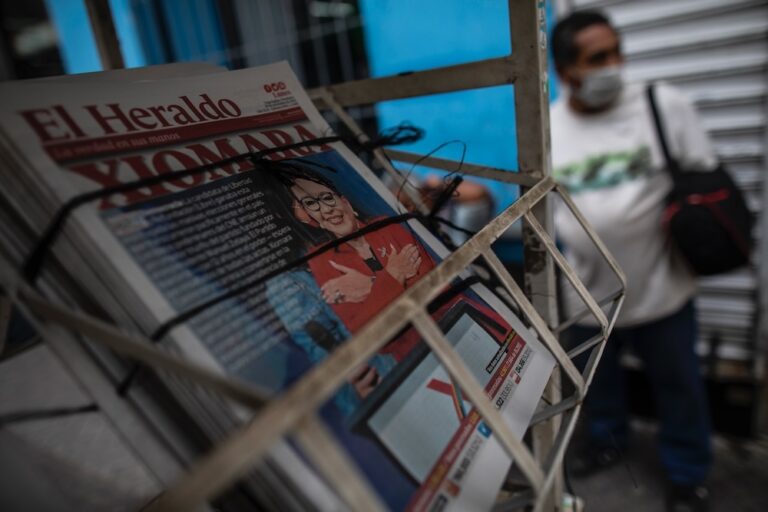(PROBIDAD/IFEX) – Journalists Nelson Fernández and Luis Fuentes, director and editor-in-chief of the daily “La Prensa”, respectively, published in the northern city of San Pedro Sula, 250 km from the capital, Tegucigalpa, are facing a defamation complaint filed against them by Supreme Court Justice María Elena Matute. Justice Matute is disputing claims published in a […]
(PROBIDAD/IFEX) – Journalists Nelson Fernández and Luis Fuentes, director and editor-in-chief of the daily “La Prensa”, respectively, published in the northern city of San Pedro Sula, 250 km from the capital, Tegucigalpa, are facing a defamation complaint filed against them by Supreme Court Justice María Elena Matute.
Justice Matute is disputing claims published in a 1 February 2005 “La Prensa” report that she is negotiating an agreement whereby she would receive 12 million lempiras (approx. US$642,000) in exchange for resigning from her post. According to the daily, the judge is stepping down in order to allow her son, Marco Tulio Hernández Matute, and her brother-in-law, Congress Secretary Juan Orlando Hernández Alvarado, to run in the 2005 elections.
In an 11 February interview with the daily “Tiempo”, also published in San Pedro Sula, the judge’s lawyer, Raúl Matute, said the newspaper’s claims “even bring into question the Supreme Court.”
After “La Prensa” published the article in question, one of the judge’s brothers asked the paper to publish his reply. According to Justice Matute, however, “the clarification that appeared in ‘La Prensa’ did not correspond to the information my brother handed to the paper’s executives on two separate occasions. As a result, I had no choice but to launch legal action. I would have preferred not to do that, because I deeply respect the role of the press but I also believe that we, as individuals, have the right to privacy and to safeguard our reputation. The article was offensive and damaging to my reputation.”
In its 11 February edition, “Tiempo” quoted the judge’s lawyer as saying that freedom of expression is a cornerstone of democracy. The lawyer added, however, that the American Convention on Human Rights and Honduras’s Law on Freedom of Thought did not protect the publication of defamatory statements by the media.
The judge in charge of the case is expected to summon the two parties to a reconciliation hearing. Lawyer Matute said he was open to reconciliation. If an agreement cannot be reached, however, the case will go to trial.
This alert was prepared by PROBIDAD with information provided by the Committee for Free Expression (Comité por la Libre Expresión, C-Libre).


